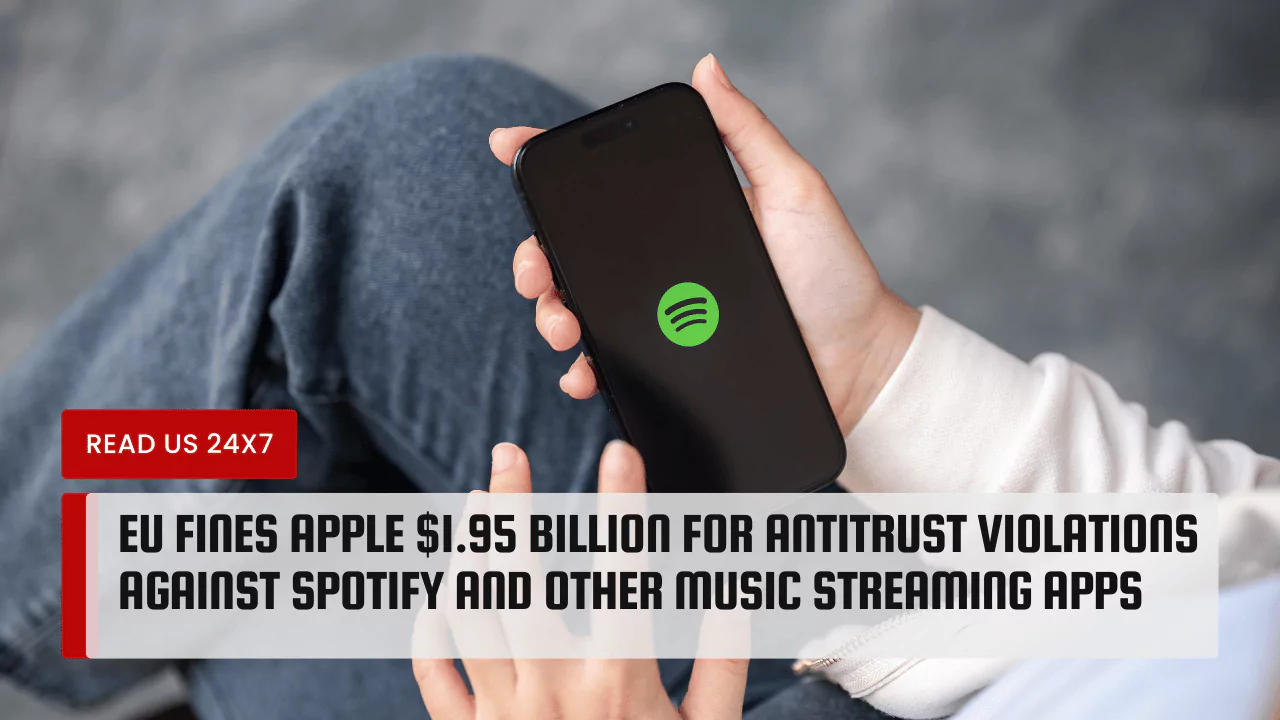The European Union (EU) has imposed a record fine of €1.8 billion ($1.95 billion) on Apple for abusing its dominant position in the market for music streaming apps. The EU’s competition watchdog said Apple restricted developers from informing consumers about cheaper alternatives to its own music service, Apple Music, and charged them high fees for using its App Store. The fine is the result of a complaint by Spotify, the world’s largest music streaming app, which accused Apple of unfair practices that harmed its business and consumers.
Apple Receives $2 Billion Fine from EU for Hindering Music Streaming Competition
The EU’s executive arm, the European Commission, announced the fine on March 4, 2024, after a two-year investigation into Apple’s rules for app developers. The Commission found that Apple violated EU antitrust laws by imposing anti-steering provisions that prevented developers from telling users about other ways to subscribe to their music services outside of the App Store. For example, Spotify could not inform its iOS users that they could pay less for its premium service by signing up on its website instead of through the App Store.
The Commission also said that Apple charged developers a 30% commission fee for every subscription made through the App Store, which increased the price of music streaming subscriptions for consumers and reduced the revenue of developers. The Commission said that Apple’s conduct lasted for almost 10 years and affected millions of users in the EU, where Apple has a market share of over 50% for the distribution of music streaming apps.
The fine is one of the largest ever imposed by the EU on a technology company, and amounts to 1.25% of Apple’s global turnover in 2020. The Commission also ordered Apple to stop its illegal practices and refrain from adopting similar measures in the future.
Spotify’s Complaint Against Apple
The case was triggered by a complaint filed by Spotify in 2019, which claimed that Apple was using its power over the App Store to stifle competition and limit consumer choice. Spotify argued that Apple was not only a competitor in the music streaming market, but also a gatekeeper that controlled the access and distribution of apps on its devices. Spotify said that Apple’s rules and fees created an uneven playing field and gave Apple an unfair advantage over other music streaming apps.
‘Muzzled’ Streaming Music Services
In its complaint, Spotify contends that Apple’s policies effectively ‘muzzle’ streaming music services by restricting their ability to communicate directly with users about various benefits, including upgrades, subscription prices, promotions, and discounts. While Apple Music enjoys the freedom to engage with users within its ecosystem, Spotify and other competitors are subject to constraints that limit their ability to reach consumers effectively.
Competition Hindering Tactics
Moreover, Spotify highlights Apple’s anti-steering rules, which prevent developers from informing iOS users about alternative and potentially cheaper music subscription services available outside of the App Store environment. This, according to Spotify, distorts competition and leads to higher prices for consumers, effectively impeding the growth and competitiveness of rival streaming services.
Reactions and Impact of the Fine
The EU’s decision to levy a substantial fine against Apple has elicited varied reactions from stakeholders, particularly Spotify and Apple itself.
Spotify’s Response
Following the ruling, Spotify welcomed the European Commission’s decision, hailing it as a victory for consumers and a step toward ensuring a level playing field in the digital marketplace. The streaming music company reiterated its commitment to challenging Apple’s practices and advocating for fair competition across all markets.
The Future of Music Streaming Services
With Apple ordered to remove anti-steering provisions and refrain from engaging in similar practices in the future, the landscape of the music streaming industry is poised for potential transformation. The ruling not only underscores the EU’s commitment to upholding fair competition but also sets a precedent for addressing anti-competitive behavior in the rapidly evolving digital ecosystem.
In conclusion, the EU’s imposition of a hefty fine on Apple for its anti-competitive conduct against streaming music services like Spotify marks a significant development in the ongoing debate surrounding fair competition in the digital marketplace. As the music streaming landscape continues to evolve, the ramifications of this ruling are likely to reverberate across the industry, shaping the future dynamics of competition and consumer choice.


